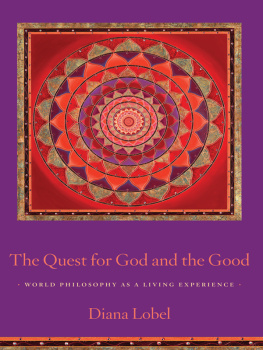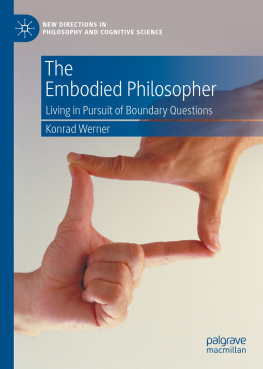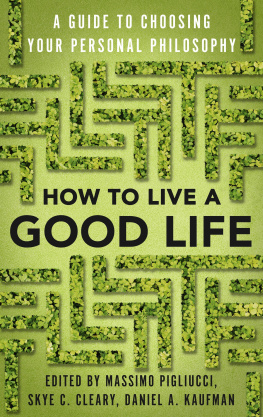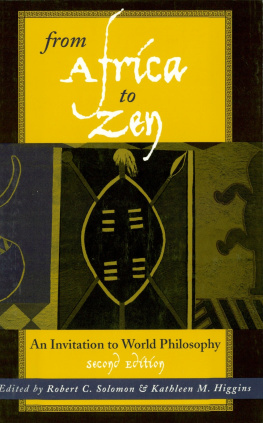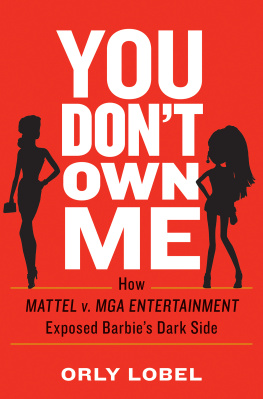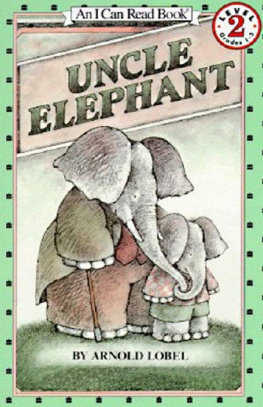The Quest for God and the Good

Diana Lobel

The Quest for God and the Good
WORLD PHILOSOPHY AS A LIVING EXPERIENCE
Columbia University Press
New York

COLUMBIA UNIVERSITY PRESS
Publishers Since 1893
New York Chichester, West Sussex
cup.columbia.edu
Copyright 2011 Columbia University Press
All rights reserved
E-ISBN 978-0-231-52701-9
Library of Congress Cataloging-in-Publication Data
Lobel, Diana.
The quest for God and the good : world philosophy as a living experience /
Diana Lobel.
p. cm.
Includes bibliographical references (p. ) and index.
ISBN 978-0-231-15314-0 (cloth : alk. paper)ISBN 978-0-231-15315-7 (pbk.)
ISBN 978-0-231-52701-9 (electronic)
1. Philosophy and religion. 2. GodComparative studies. 3. Good and evilReligious aspectsComparative studies. 4. Religious lifeComparative studies. I. Title.
BL51.L5755 2011
202'.11dc22 2010033894
A Columbia University Press E-book.
CUP would be pleased to hear about your reading experience with this e-book at .
References to Internet Web sites (URLs) were accurate at the time of writing. Neither the author nor Columbia University Press is responsible for URLs that may have expired or changed since the manuscript was prepared.
For Albert, Francine, and Janet Lobel
In countless ways, you have each shown me
the beauty of genuine kindness.

And indeed it was very good.
GENESIS 1:31
Contents
:
:
:
:
:
:
:
:
I REMEMBER VIVIDLY a moment in my first philosophy course at Oberlin College. The course was Ancient Philosophy, and given the intensive liberal arts institution that Oberlin is, six students sat in a discussion section for the course once a week with the instructor, a full professor. I remember raising a point I didnt understand in Aristotle, and the thorough joy of traveling from not understanding to understanding. At that moment I knew that this was what I wanted to do with my life.
I remember another moment, when I taught my first section on Aristotles Nicomachean Ethics for Professor Twerskys course, Moderation and Extremism, as a graduate student at Harvard. The class met on the afternoon before Rosh Hashanah. I remember the utter joy of exploring the first few pages of the Ethics, and dancing off to services with a sense that I was fulfilling my lifes purpose. This book is simply another moment of fruition in a long process of delightful engagement with philosophy and religious thought.
The book grew out of a course I have been teaching for many years, first as The Search for God and the Good in the Honors Program at the University of Maryland, College Park, then as The Quest for God and the Good at Rice University and Boston University. The course itself evolved gradually from courses for which I had served as a teaching fellow in the Core Curriculum at Harvard University: Isadore Twerskys Moderation and Extremism, Michael Sandels Justice, and Jay Harriss If There is No God, All is Permitted: Theism and Moral Reasoning. In its inception, the class read Plato, Aristotle, Augustine, Maimonides, and al-Ghazl. I found that I repeatedly drew upon Asian parallels to make concepts in the Western texts clear; as a textualist, I decided it would be worthwhile to have students read the original Asian sources as well. In my year at Maryland, I remember the interest of student Marc Fox spurring my decision to include these Asian classics, and I thank him for his enthusiasm and engagement.
At some point I became fascinated by Platos Timaeus, and brought in the Bibles book of Genesis as a natural parallel. I found students love reading the Bible with unprejudiced eyes; whenever I want to increase the engagement of the class, I bring in a Biblical text. However, I have found that students today do not necessarily know how to read primary texts themselves, and genuinely appreciate the guidance of study questions. I have included a full list of readings and study questions on the books Web site. This should make the volume user-friendly for students, instructors, and lay readers who want to delve into the works explored in these pages. I see reading as a living experience; my goal in this book is to guide readers through these classics, not to substitute for reading of the primary sources.
There are numerous people I could cite from this long journey; I will mention those who come to mind specifically regarding the present book. My research assistant Scott Girdner read through the entire manuscript and made suggestions on content, writing, organization, and structure. The book was greatly enriched by his clarity and critical judgment. Warren Zev Harvey has been a stimulating and challenging conversation partner, particularly on matters related to . While I regret taking issue with Professor Harveys view, I hope I have done justice to his formulation, and take comfort that I share the view of the late Shlomo Pines. I am grateful to David Roochnik for his generosity in discussing Platonic and Aristotelian philosophy, looking together at texts, and sharing an unpublished manuscript on Aristotle. Stephen Scully was also wonderfully generous in poring over difficult texts of Plato, Aristotle, and Plotinus. With tremendous appreciation, I thank those with whom I have had the joy of learning Greek and reading Greek philosophy: Martin Black, Claire Olwen Cairo, Tom Marre, Mark Sentesy, Tyler Travillian, and Mindy Wolfrom. To actually read philosophy in Greek has been the realization of a lifelong dream. I am also grateful for the pleasure of reading philosophical texts with Stan Dorn, Colby Phillips, and Tony Rivera. I appreciate the suggestions of David Eckel on matters related to the philosophies of India, and those of Eric Dorman, who read and critiqued that entire chapter. I am grateful to my colleagues Gina Cogan and Tom Michael for assistance with the Buddhism chapter and many matters Buddhist and Taoist. John Berthrong graciously read the chapter on Chinese religion; Brook Ziporyn shared not only his Zhuangzi book, but also material from his unpublished tome on li, The Pattern and the Pendulum. I also thank the two anonymous readers for Columbia University Press for their stimulating critique and suggestions, and my editor, Wendy Lochner, and copy editor, Kerri Cox Sullivan, for their enthusiasm for the project and their expert guidance. My thanks go to Hee Kyung Kim, who prepared the bibliography, and Brian Jenkin, who added its finishing touches. I am especially grateful to the Boston University Humanities foundation for their generous Publication Production Award for the indexing of the book.
I appreciate the friendship and support of colleagues in the Department of Religion and the Division of Religious and Theological Studies at Boston University. In particular, I would like to thank the chairs of the Department of Religion, Deeana Klepper and Stephen Prothero, for their support for my work and teaching in unimaginably kind ways. There is nothing more powerful than being seen for who we are, in our weakness as well as our strength. I am also grateful to Wendy Czik, Administrator of the Department of Religion; Melissa Merolla, Program Coordinator the Division of Religious and Theological Studies; and Karen Nardella, Administrator of the DRTS, each of whom has been a rare and delightful gem. I appreciate the support of Jonathan Klawans, currently Director of the Division of Religious and Theological Studies, who has created and modeled a culture of warmth and collegiality. I also extend thanks to Steven Katz, Director of the Center for Judaic Studies, and Pagiel Czoka, the centers administrative assistant, for their patience and kindness amidst unforeseen changes. I cannot imagine a better environment in which to teach and work.
Next page
